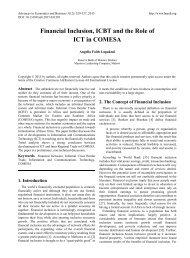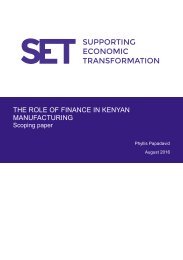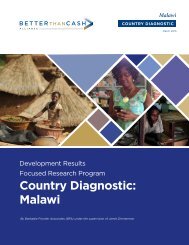FD
gvti301SEaf
gvti301SEaf
Create successful ePaper yourself
Turn your PDF publications into a flip-book with our unique Google optimized e-Paper software.
Patrick Ebewo, a Nigerian writer, attributes the popularity<br />
of Nigerian movies not only to their low unit cost but<br />
also to their “indigenous content of issues relevant to a mass<br />
audience.” Through a combination of African story lines<br />
and Western technology, “these films document and recreate<br />
socio-political and cultural events,” he said. The former<br />
director-general of the United Nations Educational, Scientific<br />
and Cultural Organization, Kōichirō Matsuura, says that<br />
“film and video production are shining examples of how cultural<br />
industries, as vehicles of identity, values, and meanings,<br />
The Nollywood film industry is not<br />
just about entertainment; it is also<br />
a moneymaker.<br />
can open the door to dialogue and understanding between<br />
peoples, but also to economic growth and development.”<br />
Actress Ebube Nwagbo notes that Nollywood has put<br />
Nigeria in a positive light by placing it on the world map.<br />
“There are lots of reasons for the industry’s success in<br />
Africa, but most importantly, it is the acceptance and recognition.<br />
They have accepted Nollywood. It’s definitely an<br />
industry to reckon with. We have been able to tell our stories<br />
in our own African way, and Africans can identify and<br />
relate to it,” she said.<br />
Lillian-Amah Aluko, actress, producer, and scriptwriter,<br />
attributes Nollywood’s success in Africa to its portrayal of<br />
Africans telling African stories in their own way and often<br />
in their own languages. “The thirst and hunger for local<br />
productions has made way for the rise of pay-per-view<br />
TV on the continent, which in turn has helped put some<br />
funding in the way of producers, either by purchasing their<br />
content or commissioning productions. Also the rise of<br />
Internet use on the continent has helped bridge a little of<br />
the distribution problems, as content is also now available<br />
online,” she notes.<br />
A long history<br />
Though filmmaking was on the rise in the 1960s, Nigeria’s<br />
domestic video industry, Nollywood, made a dramatic leap<br />
in 1992 with the release of the thriller Living in Bondage. The<br />
film, written by Kenneth Nnebue and Okechukwu Ogunjiofor,<br />
tells the story of a businessman who killed his wife in a<br />
human sacrifice ritual that made him rich overnight but who<br />
is then haunted by her ghost. It instantly became the first<br />
Nigerian blockbuster. Since then, thousands of releases have<br />
been similarly successful.<br />
The release of Living in Bondage sparked the revival of the<br />
domestic video industry, which had started decades before.<br />
In fact the Nnebue experiment followed years of hard work<br />
by pioneering filmmakers such as Hubert Ogunde, Jab Adu,<br />
Ola Balogun, Moses Olaiya (Baba Sala), and Eddie Ugboma.<br />
The industry considers these professionals the first generation<br />
of Nigerian filmmakers.<br />
Nigeria became fully involved in the production of films<br />
in the 1970s, when the first indigenous feature film, Kongi’s<br />
Harvest, written by Nobel Prize laureate Wole Soyinka, was<br />
produced in the country. But an American directed the film,<br />
and many of its crewmembers were foreigners. Later, more<br />
people, such as Balogun, Ugbomah, and Ladi Ladebo, to<br />
mention a few, got involved in producing indigenous films.<br />
Because Nigeria has such a long history of film making, many<br />
people criticize the term Nollywood for its lack of originality,<br />
merely aping the labels of the two largest film industries—<br />
Hollywood in the United States and Bollywood in India.<br />
The importance of Nollywood to the Nigerian economy<br />
was only fully realized when the Nigerian GDP was rebased<br />
in 2014. The sectors captured in the rebasing exercise were<br />
arts, entertainment, and recreation; financial institutions and<br />
insurance; real estate, professional, scientific, and technical<br />
services; administrative and support services; public administration,<br />
education, human health, and social services; and<br />
other services—these had previously not been included in<br />
GDP at all. Among the segments included for the first time<br />
were Nollywood, the information technology sector, the<br />
music industry, online sales, and telecommunications. As a<br />
result of this rebasing exercise, Nigeria’s GDP in 2013 jumped<br />
from an initial estimate of $285.5 billion to $510 billion.<br />
Opportunities for growth<br />
Clearly, the Nollywood film industry is not just about entertainment;<br />
it is also a moneymaker. The spread of digital<br />
technology has been identified as a growth driver for the film<br />
industry and will continue to play that role as domestic and<br />
foreign consumption continue to rise. Greater Internet access,<br />
increased smartphone use, and improved bandwidth are also<br />
contributing to a production boom.<br />
An increase in demand for programming is likely to generate<br />
new opportunities for content producers too. According<br />
to a PricewaterhouseCoopers report, Nigeria’s entertainment<br />
and media revenue could more than double, to an estimated<br />
$8.5 billion in 2018, from $4 billion in 2013, with the Internet<br />
a key driver. The number of mobile Internet subscribers is<br />
forecast to surge to 50.4 million in 2018, from 7.7 million in<br />
2013, according to the report. In addition, the region’s growing<br />
young population and the development of the Internet<br />
represent huge potential for the industry.<br />
Likewise, pay-TV penetration is forecast to reach 24.4 percent<br />
in 2018, with competition among digital terrestrial television<br />
operators set to grow after Nigeria migrates to digital.<br />
But there is some doubt whether the country will be able to<br />
meet the June 2016 digital switchover deadline—set by a 2006<br />
agreement brokered by the United Nations’ International<br />
Telecommunication Union.<br />
Platforms such as Nigeria’s iROKOtv offer new distribution<br />
channels for the more than 2,000 Nollywood films produced<br />
annually. The tech company, which pays filmmakers<br />
about $10,000 to $25,000 for the right to stream their content<br />
for a period of time, claims to be the world’s largest online<br />
distributor of African content, with a catalogue of 5,000<br />
Nollywood films.<br />
Finance & Development June 2016 31














